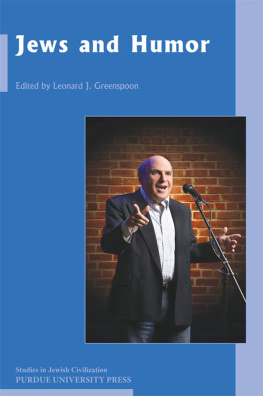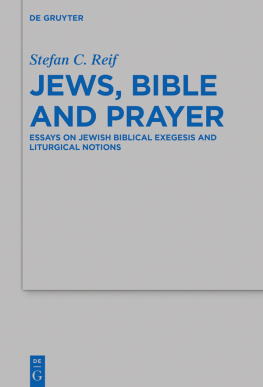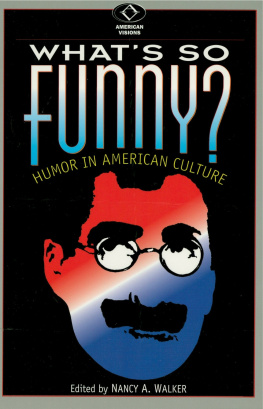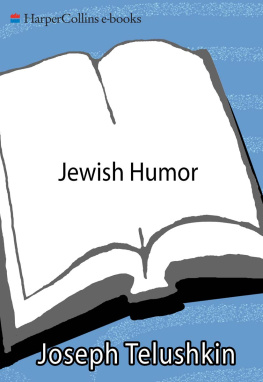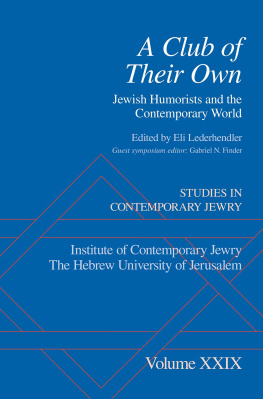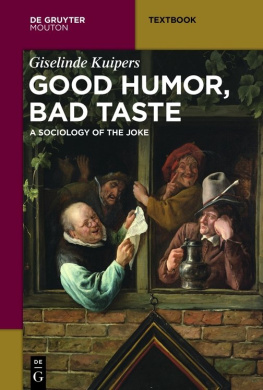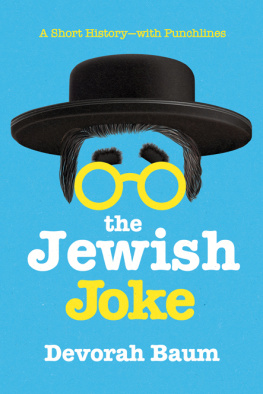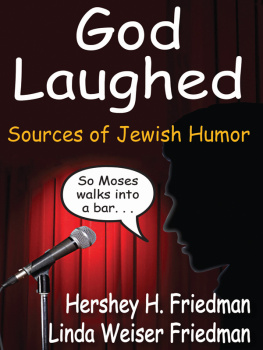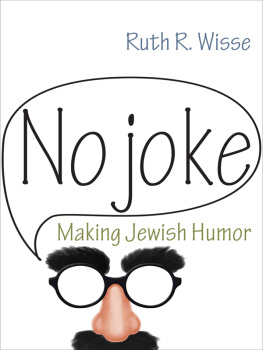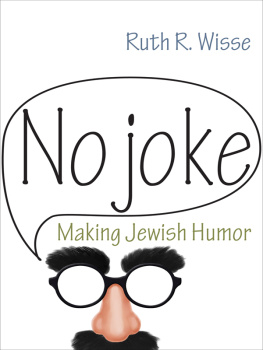Jews and Humor
Studies in Jewish Civilization
Volume 22
Proceedings of the
Twenty-Second Annual Symposium
of the Klutznick Chair in Jewish Civilization
Harris Center for Judaic Studies
October 2526, 2009
Other volumes in the
Studies of Jewish Civilization Series
Distributed by the Purdue University Press
2010 Rites of Passage:
How Todays Jews Celebrate, Commemorate, and Commiserate
Jews and Humor
Studies in Jewish Civilization
Volume 22
Editor:
Leonard J. Greenspoon
The Klutznick Chair in Jewish Civilization
Purdue University Press
West Lafayette, Indiana
Copyright 2011, by Creighton University
Published by Purdue University Press
All rights reserved
Manufactured in the United States of America
Paper ISBN: 9-781-55753-597-9
ePDF ISBN: 9-781-61249-154-7
ePUB ISBN: 9-781-61249-155-4
No part of Studies in Jewish Civilization (ISSN 1070-8510) Volume 22 may be reproduced or transmitted in any form or by any means, electronic or mechanical, including photocopying, recording, or any information storage and retrieval system, without permission in writing from the Publisher, except in the case of brief quotations embodied in critical articles and reviews.
Front cover photo courtesy of Michael Kleveter, Michael K Photography.
Dedicated to
Dorothy C. Riekes
Table of Contents
Humor in the Bible
Charles David Isbell
Why Did the Widow Have a Goat in Her Bed? Jewish Humor and Its Roots in the Talmud and Midrash
David Brodsky
But Is It Funny? Identifying Humor, Satire, and Parody in Rabbinic Literature
Eliezer Diamond
Masekhet Purim
Peter J. Haas
Jewish Humor as a Source of Research on Polish-Jewish Relations
Joanna Sliwa
Jewish Jokes, Yiddish Storytelling, and Sholem Aleichem: A Discursive Approach
Jordan Finkin
Groucho, Harpo, Chico, and Karl: Immigrant Humor and the Depression
Leonard M. Helfgott
Nuances and Subtleties in Jewish Film Humor
Michael W. Rubinoff
The Bad Girls of Jewish Comedy: Gender, Class, Assimilation, and Whiteness in Postwar America
Giovanna P. Del Negro
One Clove Away From a Pomander Ball: The Subversive Tradition of Jewish Female Comedians
Joyce Antler
Heckling the Divine: Woody Allen, the Book of Job, and Jewish Theology after the Holocaust
Jason Kalman
Tragicomedy and Zikkaron in Mel Brookss To Be or Not To Be
Joan Latchaw and David Peterson
They Aint Makin Jews Like Jesus Anymore: The Musical Humor of Kinky Friedman and The Texas Jewboys in Historical and Geographical Perspective
Theodore Albrecht
The New Jewish Blackface: African American Tropes in Contemporary Jewish Humor
David Gillota
Acknowledgements
The Twenty-Second Annual Klutznick-Harris Symposium took place in Omaha, Nebraska, on October 25 and 26, 2009. Like this volume, it was titled Jews and Humor.
All of the chapters in this collection, with the exception of the one by Jordan Finken, are based on presentations made at the Symposium. Finkens paper first appeared as an article, with the same title, in Jewish Social Studies16:1(2009): 85110, published by Indiana University Press. Finkens article is reprinted here with the Presss permission.
The first Symposium that I organized was held in October 1996. The Symposium on Jews and Humor is therefore the fourteenth one in which I have played a roleif my math is correct. While we have, over the years, developed positive working relationships with a number of people, the planning and implementation of a Symposium, even one related to jokes and story telling, are not all fun and gamesalthough a sense of humor is sine qua non.
It is equally important to make sure that the people with whom you work combine expertise and experience with their own individual senses of humor. In this regard, I have been, I dont mind saying, blessed in all respects by my colleagues: Dr. Ronald Simkins, director of the Kripke Center for the Study of Religion and Society at Creighton; Dr. Jean Cahan, director of the Harris Center for Judaic Studies at the University of Nebraska-Lincoln; and Mrs. Fran Minear, who works with both Ron and me. Additionally, Mary Sue Grossman, of the Omaha Jewish Federations Center for Jewish Education, insures that everything runs smoothly at the Jewish Community Center, where our presentations take place on Sunday. An equally committed group of individuals works with us on Monday for an equally smooth series of events on the Creighton campus.
This volume is the second in our collaboration with the Purdue University Press, whose staff, under director Charles Watkinson, has consistently made us feel at home among the growing number of Jewish Studies publications of the Press.
In addition to the the Harris Center, the Kripke Center, and the Jewish Federation of Omaha, this Symposium was nourished and supported by the generosity of the following:
The Ike and Roz Friedman Foundation
The Riekes Family
The Creighton College of Arts and Sciences
Creighton University Committee on Lectures, Films, and Concerts
The Gary Javitch Family Foundation
The Center for Jewish Education
The Henry Monsky Lodge of Bnai Brith
The Dr. Bruce S. Bloom Memorial Endowment and Others
This volume is dedicated, in loving memory, to Dorothy C, Riekes, whose generous support has enabled us to bring together the community at each Symposium.
Leonard J. Greenspoon
Omaha, Nebraska
May 2011
Editors Introduction
Just the other day something very funny happened to me on my way to work. And it wasnt long ago that I heard a great joke. How about that really humorous movie I saw last month?
I guess that I can admit it: Im pretty good at identifyingand appreciatinghumor when I hear it, or see it, or read it. Perhaps, nobody enjoys a good joke as much as (or even more than) I do.
None of this makes me a particularly funny person or a humorous one (if there is a distinction between the two). However, it does allow me to benefit, and derive great pleasure, from my role as editor of this volume because I have been afforded the opportunity to be the first to read each of the fourteen chapters that make up this collection. And, I am happy to report, each of these chapters is a delight to read, a fine example of what I might term a felicitous cooperation between style and subject matter.
Alas, this is not always the case among scholars, who have the unfortunate propensity to overanalyze, overload, and overlook even (or especially?) when presented with a topic so naturally enchanting as Jews and Humor. In no way am I diminishing the significance of research in this area or the difficulties that arise when trying to isolate salient and distinguishing features of this phenomenon; at the same time, I can barely suppress a sigh of contented relief that these authors really do allow the humor that they are discussing to shine forth.
It is with this thought in mind that I am including one joke or humorous story from each chapter in this Introduction. To the degree that we can get the joke or point prior to reading the chapter, the material that I have selected for inclusion here may be thought of as universally accessible. But, as will become increasingly evident as readers go to the individual chapters themselves, many of these jokes or stories reveal the fullness of their multivalent richness only to those who appreciate the background or context in which the story and storytelling originated.

